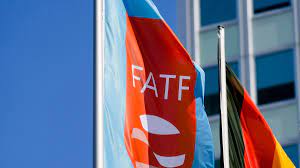
There are many pitfalls of a country being on the grey list, including its citizens with offshore bank accounts risking being subjected to enhanced due diligence.
Latest reports have indicated that South Africa has put more anti-money laundering measures in place to exit the Financial Action Task Force (FATF) grey list.
FATF, the global watchdog with the mandate to combat money laundering and terrorism financing had in February 2023 placed Nigeria, South Africa and 20 others on its grey list, following deficiencies in their legislations to counter money laundering, terrorism financing and proliferation financing.
There are many pitfalls of a country being on the grey list, including its citizens with offshore bank accounts risking being subjected to enhanced due diligence, with increased difficulties in opening overseas bank accounts or investing offshore.
The economy of a greylisted nation might also suffer as international organisations would have to audit companies and take extra steps before investing in the country. This could be especially significant for Nigeria, as the country’s foreign direct investment (FDI) has been plummeting in the past few years.
However, while Nigeria had less than three weeks ago failed to scale a review of Money Laundering and Terrorism Financing Risks conducted by the global financial intelligence agency, the latest FATF follow-up report on South Africa’s anti-money laundering (AML) regime found significant improvements in many respects, although some areas remaining in partial compliance would keep it under increased monitoring until the next FATF report in October 2024.
At its plenary held between October 25 and 27 in Paris, France, FATF had reviewed Nigeria’s money laundering and terrorism financing risk.
Despite claims by the Nigerian Financial Intelligence Unit (NFIU) that it had been working to meet the FATF recommendations on money laundering and terrorism financing, it failed to scale the review carried out by the global anti-money laundering watchdog during its last plenary in France.
Nigeria had also alongside Haiti, Syria, Tanzania and Yemen chosen to defer reporting during the FATF meeting in June, when the progress of the affected countries was reviewed.
Nine months after it was grey-listed, Nigeria is yet to meet the 15 recommendations imposed by the FATF.
In contrast, South Africa has reportedly made progress in addressing most of the technical compliance deficiencies identified in the mutual evaluation of June 2021. That evaluation rated it non-compliant with five of FATF’s 40 recommendations and only partially compliant with 15.
Those deficiencies resulted in South Africa being placed in ‘enhanced follow-up’ and in February 2023 it was alongside Nigeria added to the FATF list of jurisdictions under increased monitoring for AML weaknesses.
The latest report giving the Southern African nation kudos was the first follow-up in which South Africa has sought re-ratings. It has resulted in FATF upgrading the country on 20 recommendations.
Recommendations 5 and 23 have been upgraded from partially compliant to fully compliant.
These refer respectively to the existence of an offence of terrorist financing and to the regulation of designated non-financial businesses and professions (DNFBPs).
Recommendations 1, 7, 10, 14, 18, 22, 24, 25, 26, 27 and 28 have been upgraded from partially compliant to largely compliant. These recommendations mostly refer to customer due-diligence, money transfer services, foreign branches, beneficial ownership transparency and supervision powers.
FATF also upgraded Recommendation 12 on politically exposed persons from non-compliant to largely compliant.
Recommendation 17, regarding firms’ reliance on third parties, was changed from non-compliant to ‘not applicable’, because regulated institutions in South Africa were no longer allowed to delegate their AML compliance to third parties.
Recommendations 6 (terrorism-related sanctions), 8 (non-profit organisations) and 15 (virtual assets) have been upgraded from non-compliant to partially compliant.
A notable success is the re-rating to largely compliant of the key Recommendations 24 and 25, regarding beneficial ownership transparency of legal persons and arrangements.
South Africa has made considerable efforts in 2023 to meet the demands set out by FATF in February 2023, which emphasised the importance of “enforcing the rules on giving competent authorities timely access to accurate and up-to-date beneficial ownership information.”
Laws requiring compulsory registration of trust and company beneficial ownership took effect on April 1, 2023 and a strict enforcement programme began on October 1, 2023.
However, FATF has noted that the jurisdiction was still only partially compliant on five of its recommendations. It would, therefore, remain in enhanced follow-up until the next report in October 2024.
The five recommendations that still needed work were 2, 6, 8, 15 and 32; referring to national coordination of AML efforts, targeted financial sanctions related to terrorism, non-profit organisations and new technologies such as virtual currencies and cash couriers.
The FATF recommendations set out a comprehensive and consistent framework of measures that countries should implement in order to combat money laundering and terrorist financing, as well as the financing of proliferation of weapons of mass destruction.
Copyright © ENTREPRENEURSHIP DEVELOPMENT INSTITUTE 2015. All rights reserved.
Powered by: C.B.N